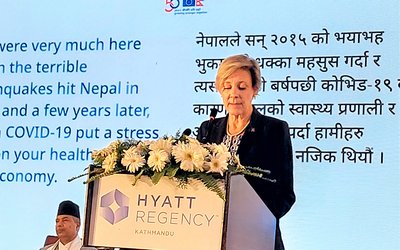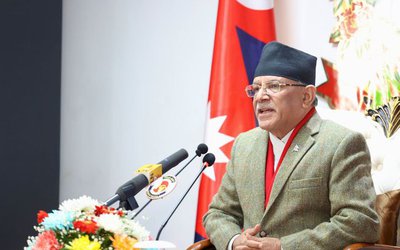As this column is being written, a dangerous escalation has occurred in the NATO-Russia conflict in Ukraine; and, as if this were not enough, the Middle East is about to see the eruption of a major regional war. After France’s Emanuel Macron announced he would be sending French troops to Ukraine and UK’s David Cameroon said Ukraine was free to attack deep into Russia with British weapons, (including warmongering US politicians like Hakeem Jeffries baying for Russian blood),Russia announced its first ever tactical nuclear weapons drill and warned the Western Europeans it would respond by striking their military facilities in Ukraine and beyond! It has led India’s strategically astute foreign minister S. Jaishankar to warn that all this could be merely a teaser compared to the actual conflicts that could unfold.
Following Israel’s Netanyahu announcing that he would invade Rafah no matter what (and orderingPalestinian civilians to evacuate), Israel-Hamas Cairo truce talks are near collapse.Gaza has become another major flashpoint with much wider ramifications: Houthis of Yemen came out strongest among the Arab nations in supporting Hamas’ effort to liberate Palestine from Israeli occupation by practically closing the Red Sea (and the Suez Canal) to shipping of Israel supporting Western countries. It has forced European cargo to go around Africa at much greater cost, thus contributing to European inflation and EU recession; and it has also demonstrated the helplessness of US Navy to do much of anything about it.
Till the middle of the last century, it used to be said that Brittania ruled the global waves, that power shifting after World War-II to the US. Now, reminding the world anew of US Congressman Matt Gaetz’s bemoaning US losing in Afghanistan to “a bunch of goat herders waving rifles”, its global naval might seems equally helpless against a bunch of Arab camel herders!
Both these conflicts did not suddenly start now: they have old antecedents going back to the post-World War-II defined Bretton Woods world order, its slow unravelling since1971 with Nixon abandoning the Gold Standard, and its accelerating decline at the start of this century with America breaking its promise to Gorbachev not to expand NATO eastwards. As Putin has so perceptively remarked in his many annual 4-hour long press conferences as well as in the famous 2007 Munich Security Conferencespeech, with the collapse of the Soviet Union, the Warsaw Pact collapsed and with it the occupation of Eastern Europe ended. However, the (US) occupation of Germany, Japan, South Korea and other WW-II places continues.
NATO – whose purpose in Europe was so accurately described by its first Secretary General Lord Ismay as “keeping the Russians out, the Americans in, and the Germans down” – should have been disbanded or downsized: instead, it was expanded right to Russia’s border and indeed even to the Indo-Pacific to presumably now keep the Chinese down! With the blowing up of Nord Stream pipeline and forcing Europe off cheaper Russian gas to importtriply expensive American LNG, Germany is forced into de-industrialization and certainly kept very well down in an ironic reversal of Marshall Plan!
The third decade of the Twenty-First Century got off to an ominous start. It began with Covid whose origins as well as vaccine responses are shrouded in murky human corruption and complicity mysteries, and which put a break on the march of globalization as we have known it. It not only exposed the fragility of global supply chains and disrupted commerce and industry worldwide but it also forced governments North and South to revert to rethinking “localization” instead. Leaders with mass support such as Narendra Modi and Donald Trump began to talk of “Make in India/America”. Countries would need to be self-sufficient in basic necessities such as food, clothing and energy available locally if their lives and economies were not to be violently disrupted. Such a localization of food and energy production would greatly reduce the environmental water and CO2 footprints of goods and services we all consume when they are imported from afar with subsidized fossil fuel-based transport.
Ukraine on the other hand exposed the limits of the power of the Collective West to enforce its will via proxy wars and fiscal sanctions against Russia, sanctions that had not worked even against Cuba, North Korea or Iran. They did not stop Iran from becomingthe pre-eminent military power in the Middle East or North Korea from developing its own nuclear deterrence. It certainly has not stopped Russia from strengthening its military capability, economy and, judging from support from Africa and BRICS countries, its diplomacy as well. Quickly followed by Israel’s Gaza holocaust and the mass protests against it in campuses and streets of the Collective West, Houthi Red Sea blockade in retaliation as well as Iran’s response to Israel bombing its diplomatic mission in Syria, the secondary position of declining Europe in G7 in relation to a rising BRICS is becoming obvious to beholders in the Global South.
Whatever the final outcome of Ukraine and Gaza wars, the biggest long-term impact is going to come from the rapid move towards de-dollarization it has precipitated, something self-inflicted by the US with its ill-thought of adventurism. Fiat paper currencies are based on faith, with the dollar as both global reserve and trading currency. The first blow against it was by Nixon in 1971 when he took the dollar off the gold standard. America, despite the OPEC shock that the move precipitated in 1973, was able to weather the storm till 2008 by printing its currency and selling US treasury bonds abroad. It allowed the US to essentially export inflation to other countries, live beyond its means, and to allow US economic policy makers the complacent belief that this would last forever.
It did not. Sanctioning Russia in 2014 and seizing its currency holdings in Western banks (and threatening similar measures against China, India and other countries that did not support the West’s position) upended all that. It sent the message to governments and billionaires around the world that if the US could do this to Russia and China, what was to prevent it from doing the same to them? The dollar was a global currency, not just a US one, with the US being a trustee or custodian of that global faith. With wanton sanctions and threats, it violated that trust. Now, despite Janet Yellen’s frequent trip to China to plead for its buying more US treasury bonds, it seems not just China but Japan as well as African and Middle East nations are dumping their US bonds in favour of buying gold.
How are we to understand this tectonic shift and the decline of the old world order? Italian political economist Giovanni Arrighi provides crucial insights. Examining the hegemonic rise of capitalist state powers from Genoa and Spain in the 14th Century to Dutch, British and finally the US today, he shows that the decline starts when the hegemon shrinks away from the real productive economy to emphasis on finance, shifting from accumulation by productive material expansion to one by financial intermediation and speculation. (Remember “junk bonds” of the 2008 financial crisis?).
It all started with Western hubris when the Soviet Union collapsed with the fall of the Berlin Wall. As“the world’s only super power”, the US felt that controlling global finance, much like the Genoese and Dutch bankers did in the 14th Century, would allow it to rule the world even as its dirty, polluting industries (highlighted by US deputy treasury secretaryLarry Summers infamous memo) were exported to the Global South. What the Genoese and the Americans forgot is that when manufacturing power shifted, with it shifted basic economic and military power.
And when the financial hegemon began weaponizing the US dollar to meet political and strategic objectives (e.g., “inflicting strategic defeat” on Russia and China through sanctions and assets seizure), it boomeranged on the hegemon exposing its feet of clay! Similar to agriculture where once the “culture” of agriculture is lost which cannot be easily restored, when manufacturing capability has shifted from US to China and other BRICS countries, the US and declining Europe cannot easily recover that back overnight like a quick financial transfer.
What lies ahead in these murky times, especially for small countries such as Nepal, as the old world order dies but a new one is yet to be born? No easy answers are found in the sciences, social or economic. Nepal’s Hindu Jaimini astrologers have long maintained that the zodiac configurations with Saturn’s two-and-a-half-year transition in Capricorn starting January 2020 and in Aquarius in 2022 (interestingly, the former coincided with Covid and the latter with Ukraine!) foreshadow “epoch-changing” shifts. (Interestingly, when I mentioned this to European friends, they sent me this European version!) We do live in very uncertain times when scientists have to fall back to these traditions to make sense of the present!
As a minimum, what small countries like Nepal need to do is to maintain strict non-alignment and neutrality, giving neighbouring and distant great powers no occasion to feel threats might be emanating from Nepal. They also have to prepare for the coming global economic upheaval by focusing on local production of food and other necessities. Alas, that would require the scarcest of commodities in this poor country – upright leaders with vision!

Dipak Gyawali
Gyawali is Pragya (Academician) of the Nepal Academy of Science and Technology (NAST) and former minister of water resources.
- Maldevelopment And Technology: Ethos Harbingering Coming Apocalypse
- Apr 03, 2024
- World Social Forum: Rethinking and Redefining Development Itself
- Feb 21, 2024
- Remembering An Inspiring Karma Yogi
- Jan 09, 2024
- New World Disorder And The Case For Ideology
- Dec 13, 2023
- Loktantra’s Moral Turpitude
- Nov 06, 2023
















